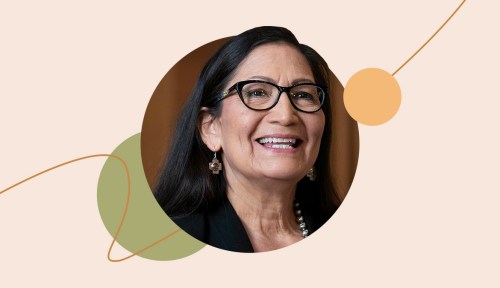Deb Haaland Promises Environmental Justice as Secretary of the Interior
Deb Haaland was sworn in as the first Native American Secretary of the Interior, a crucial position to fight for environmental justice.

Today is a historic day for environmental justice. Deb Haaland, a member of New Mexico’s Laguna Pueblo, was sworn in as the first Native American Secretary of the Interior, a crucial position responsible for leading the nation’s efforts to combat the climate crisis while upholding conservation efforts. Haaland’s record of environmental justice priorities is what makes environmentalists feel especially hopeful following her confirmation.
Experts in This Article
Erica Walker is a postdoctoral associate of environmental health at Boston University’s School of Public Health.
Rebecca Rae of the Jicarilla Apache Nation is a researcher and lecturer III at the University of New Mexico’s College of Population Health.
Environmental justice is the right and access to clean and healthy surroundings. All communities need clean water and air in order to live healthier lives, but many communities of color in the United States aren’t afforded these conditions. Throughout history, initiatives with a negative environmental impact, such as drilling to the building of pipelines, have disproportionately impacted communities in the United States. “In many of our tribal communities, when we host and hold ceremonies, when we offer prayers, and when we think about our songs and the language, that’s all connected to the land,” says Rebecca Rae, MCRP, MWR, member of the Jicarilla Apache Nation and researcher at the University of New Mexico’s College of Population Health. “The level of extraction that happens in our community has a direct impact on the social, physical, mental, and spiritual wellbeing. When corporations extract uranium or timber or build pipelines through our water sources, that has a direct impact on our communities.”
Beyond Haaland’s proposed policies, tribal leaders and environmentalists have noted the symbolism of her confirmation given the Department’s of Interior’s turbulent history, neglect of tribal programs, and lack of recognition of tribal sovereignty. “It’s historic watching this Indigenous woman being sworn into an office that has been historically part of the genocide of our people, says Rae.
The Department of Interior has directly influenced tribal livelihood because it encompasses two major powerhouses: the Bureau of Indian Affairs (BIA) and the Bureau of Indian Education (BIE). For example, during the 1800s, the U.S. government used boarding schools to assimilate Indigenous children, which forced them to abandon their traditions and languages. “Native children were ripped from their homes without consent from their parents, and moved into boarding schools as part of the assimilation process,” says Rae. “[The Department of Interior] directs our communities, all the way from our livelihood to our treaty responsibilities that are supposed to be in place.” Secretary Haaland now oversees the department’s control of federally owned land and natural resources, as well as federal policies involving the 574 federally recognized tribes.
Prior to her confirmation, Haaland served as the U.S. representative for New Mexico’s 1st congressional district. She has long been an outspoken advocate who mobilized House members for various environmental justice priorities including the 30×30 effort, a conservation plan to protect 30 percent of U.S. lands and oceans by 2030.
Haaland introduced the ANTIQUITIES Act on February 7, 2019, in an effort to recognize national monuments, re-expand Bears Ears national monument to 1.9 million acres, and federally protect 250,000 acres of New Mexico. “As my first piece of legislation this bill expands on my efforts to fight climate change by protecting land from extraction, honor our sacred sites, and ensure our beautiful places are here for future lands. Our public lands are not for sale,” Haaland said in a press release at the time. Although the bill died in Congress, it served to highlight her priorities and some of its provisions were incorporated into other bills.
“I’m hopeful that because she understands environmental justice issues, she can now make it a part of the national conversation,” says Erica Walker, ScD, postdoctoral associate of environmental health at Boston University’s School of Public Health. With Haaland’s confirmation, Walker and Rae hope environmental justice will be restored for communities that have been most impacted by drilling, encroachment, deforestation, pipelines, and more. “I look forward to tackling some of the nation’s most pressing issues with @Interior so that future generations can enjoy our public lands and waters for years to come,” Haaland tweeted after her confirmation.
Haaland’s confirmation gives hope to those fighting for environmental justice in the United States. “I look forward to a degree of dismantling these historical systems that have not always been beneficial to our communities,” says Rae. “Many communities throughout our nation have not benefited from this hierarchal system. And I’m really looking forward to the recognition of our education, the uplifting and upholding our treaty rights and our sovereignty.”
Sign Up for Our Daily Newsletter
Get all the latest in wellness, trends, food, fitness, beauty, and more delivered right to your inbox.
Got it, you've been added to our email list.








